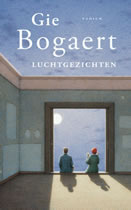Gie Bogaert
Cloud Faces (Luchtgezichten)
The limited feasibility of desire
Gie Bogaert’s new novel Luchtgezichten (Cloud Faces) is the third of three books which work together as a trilogy but which stand equally well alone. In the first of the three, a collection of stories called Hemelstof (Heavenly dust, 2004), various characters play supporting roles in one another’s stories and, as the book progresses, this effect increases. In the final story, a daughter tells her dying father the soothing fairy tale which he had told her in the first story when she was still a child.
In Opklaringen (Sunny Spells, 2006), a tourist guide writer travels through Germany, France and Italy with his estranged daughter, in order to reconcile himself both with her and with her mother’s death, from an accident that he had caused. ‘What you feel is always bigger than what you see,’ ponders a character in Hemelstof. The main theme of this trilogy is the tragic incompleteness of life where there is an unfulfillable emotional lack.
Lambert, the protagonist of Luchtgezichten and a trader in old mirrors, finds his counterpart, Lana, when she, on becoming blind, wants to dispose of her mirror. At her request, he reads to her on a weekly basis from books from her own library. She is someone he knew when she was still a child and, again, as a student. On both earlier occasions their careful approaches were cut short, and although his virgin desire now resurfaces, Lambert chooses not to make himself known to her, as he has cancer. And although Lana knows exactly who he is, she too restrains herself from taking things further. During their last session, he reads to her what he has written over the years they lived apart.
The author alternates between Lambert’s and Lana’s points of view, delving deeply into their inner feelings, which particularly in the case of the blind Lana results in strikingly sensual prose. Bogaert is good at creating tranquil, intimate scenes; keenly observed, finely detailed cameos. His apparently modest prose which appears to register nothing other than daily reality, in fact abounds with moods and emotions, melancholy and restrained tragedy.
Publisher
Podium
Vossiusstraat 3
NL - 1071 AB Amsterdam
TEL. +31 20 421 38 30
FAX +31 20 421 37 76
E-mail: [email protected]
Website: www.uitgeverijpodium.nl
Publishing details
Luchtgezichten (2010, 136 pp)

Biography
Gie Bogaert (b. 1958) is a Germanist and teaches prose at the SchrijversAcademie (Writers’ Academy) in Antwerp. His debut, Wat kwaad doen de tovenaars? (What Harm do the Magicians? 1990), was followed by Keizer Doede (Emperor Doede, 1992) and Wat we met de liefde doen (What We Do with Love, 1995). After De liefdeverzamelaar (The Love Collector, 1998) and Nathan Meyer, vrouwenwandelaar (Nathan Meyer, Women Walker, 2000) came the melancholic Hemelstof (Heavenly Dust, 2004) about the little luck a series of characters manages to extract from life.
Website: www.giebogaert.be
Quotes
In Gie Bogaert’s books all the senses are alert. He is a master of the impression.
Trouw
In his delicately constructed Luchtgezichten, Bogaert once again plainly demonstrates his craftsmanship.
De Morgen
His prose is peppered with extraordinarily beautifully formed sentences full of magnificent words.
8weekly
